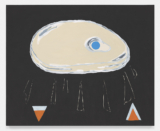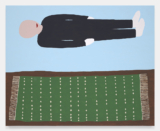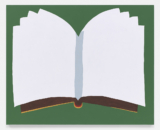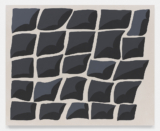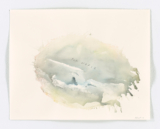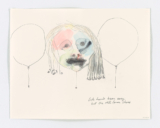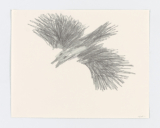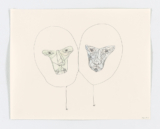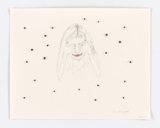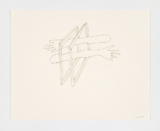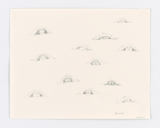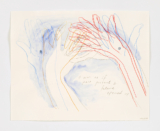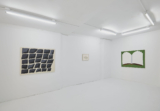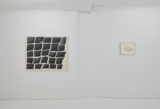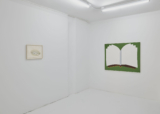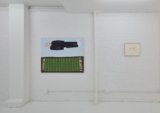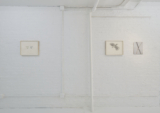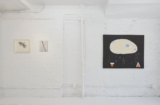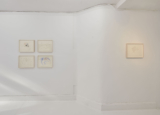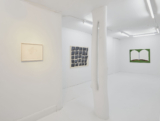November 4th – December 16th, 2018

UV print on Dibond
12 X 9 inches
Enell’s paintings and drawings are deeply rooted in dreams. Like the surrealists before her, the artist creates layered spaces and stratified worlds, tied to the psychological realm and driven by free-associations. This may be a reason why drawing in particular plays a central role in her practice. It is the medium of immediacy, most intimately connecting the psyche to the paper and to the viewer. Through her drawings the artist translates her experience of the world into images, words or scribbled captions, and symbolism.
While the creation process in Enell’s work is tied to dreams and the meandering of the mind, it is not disconnected from our present. “Strange is part of the work,” she recently told me. And strange is indeed part of our daily lives, the unfamiliar, the extraordinary, ill-fitting, along with a desire to burrow at times, to escape, to disassociate, to stop the rapid flow of time; just like in the odd (strange) still moments she depicts.
Perhaps because both her parents were artists, lineage is an uneasy notion for Enell. Kinship is more comfortable. When discussing lineage, the artist commonly refers to a seminal moment she experienced as child, maybe four or five years old, during a visit of S.M.A.K in Ghent, Belgium, with her a parents. At the museum, she encountered Panamarenko’s Krokodillen, 1967, an installation of cardboard, cellophane, and plastic tiles shaped into an octagonal basin. In this dry, makeshift pool divided in two, lie three crocodiles, each made up of sand and stones in plastic, wrapped in fishing net. While she grew up in the painting studio of her parents, Krokodillen was her first own “art memory.” A beginning. The work’s symbolism is seminal to the practice, of course, but there is also a sense of perspective and inner geometry that can be traced back to this installation and that remains in Enell’s paintings today. It is a viewing mechanism that she has successfully translated to two-dimensions, like in the collapsed perspective of OFF, 2017. If it grew out of that early memory in Ghent, it gained momentum in the 1990s, when subject matter was directly under an artist’s nose (the “everyday”), and much of painting was flat (Michael Craig-Martin, Alex Katz, Marlene Dumas).
To look at Enell’s work is to be in communion with her; an intimate if somewhat abstract experience. The viewer shares in the artist’s desire to connect thoughts of the world and of the mind; ours and hers; building meaning through juxtapositions in a different type of perspective.
Renaud Proch
Photographies: © Tom Powel Imaging
Mia ENELL (b. 1967, in Gothenburg, Sweden) is an interdisciplinary artist working mainly in painting and drawing, but also using other media such as photography, video, installation and sculpture. She is best known for her paintings, watercolors and drawings depicting the eccentricities of her inner life, often with humor and a surrealist bent. Haiku-like phrases–inspired by dreams or drawn from the unconscious– serve as titles. Enell likes to play with text, which features prominently in many of her works.
Enell spent her youth growing up between Sweden and Antwerp, Belgium. Enell is a graduate of the Nyckelvik Art School in Stockholm (1987) and received her DNSAP/ MFA from the Art Academy “Beaux-Arts” (ENSBA) in Paris (1992), where she lived for ten years. During her time there she was deeply involved in the French art scene and has exhibited extensively in France. Since 1997, she has been living and working as an artist in New York City, while exhibiting internationally.
Renaud PROCH is Independent Curators International (ICI)’s Executive Director, and from 2009 to 2013, he served as ICI’s Deputy Director. Prior to this he was Senior Director at the Project in New York, as well as Director of MC, in Los Angeles. Originally from Switzerland, Proch studied in London, and moved to the West Coast of the U.S. in 2001. He co-founded ART2102 of Los Angeles in 2003, a non-profit organization that realized projects by artists and curators on- and off-site; and the backroom in 2005, an evolving archive of artists’ source materials and itinerant research project presented in five cities in the U.S., Mexico and France. In 2011, he co-curated with Khwezi Gule a retrospective of South African artist Tracey Rose for the Johannesburg Art Gallery, South Africa, and the Umea Bildmuseet, Sweden, which also traveled to the Nikolaj Kunsthal, in Copenhagen, Denmark.

